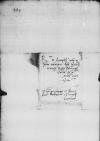List #794
Caspar URSINUS Velius do Ioannes DANTISCUSInnsbruck, 1532-06-10
| odebrano Regensburg, [1532]-06-13 Rękopiśmienne podstawy źródłowe:
Pomocnicze podstawy źródłowe:
Publikacje:
| ||||||||||||
Tekst + aparat krytyczny + komentarz Zwykły tekst Tekst + komentarz Tekst + aparat krytyczny
Reverendissimo et amplissimo Domino domino
Reverendissime et Amplissime Antistes, domine benefice et unice observande. Secundum debitam commendationem.
Salutem.
Cum
Quare factum est, ut hactenus ad Amplitudinem Tuam nihil dederim litterarum intermiserimque scribendi officium. Verum ubi nuper accepissem litteras a Brassicano, ex eis intellexi Dominationem Tuam Reverendissimam adhuc haerere aulae
Commendo me Amplitudini Tuae itemque ab eadem magnifico domino
Eiusdem Dominationi Vestrae Reverendissimae deditissimus


 Bcz 243, p. 234
Bcz 243, p. 234